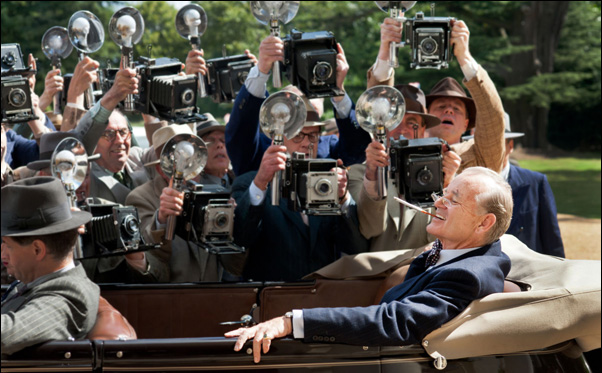The only way to explain “Hyde Park on Hudson,” a remarkably misguided historical snapshot of a meeting between Franklin Delano Roosevelt and King George IV (who got his closeup in “The King’s Speech”), is to recognize the clever idea at its core, the peeling back of a public persona that is created collectively and why often we prefer the fiction to the facts. Of course, with Roosevelt, the mythmaking began well before he created the New Deal, those around him even in the ranks of the press refusing to divulge to the outside world that he was crippled by polio. But whereas that fib might seem like a noble choice, “Hyde Park on Hudson” sheds light on something FDR no doubt would prefer to remain private even after his death, an affair he had with Daisy, his “fifth or sixth cousin” according to her count in the film, that was revealed after she died by private diaries she kept.
While “Hyde Park on Hudson” attempts to deconstruct our desire to look past the faults of those we choose to lionize, the film is hamstrung by tonal inconsistency and its insistence on giving its weightiest role to Daisy, which in modern terms would be akin to making a biopic of Bill Clinton told entirely from Monica Lewinsky’s perspective. With Laura Linney playing her, Daisy can’t become a punchline, but she also can’t be taken seriously as a narrator, well out of her depth as an observer who’s asked to be naïve and coy about her intimate relationship with the President, but well-schooled enough on foreign affairs to omniscently comment on his congress with the King (Samuel West).
Of course, the woman the President calls to give him a handjob in a field nearby his house away from the White House might be privy to details that no one else would know, but the mix of the private and personal lives never informs the other in the script from Richard Nelson and Daisy, left undefined in any other terms but her proximity to FDR, is a real drag on the film when the tenuous relationship between America and England on the eve of World War II is clearly of more intrigue, even without historical context, making “Hyde Park on Hudson” perhaps the first film to succeed at making international affairs a sexier subject than actual sex.
Any time spent in Daisy’s company alone also means less time spent with Bill Murray’s FDR, which is one of the film’s few saving graces. Clenching the cigarette holder between his incisors just right and perhaps being the most personable he’s ever been onscreen, Murray’s performance is loose and charming and a suggestion of what the film could’ve been if it actually addressed a duality in his persona that “Hyde Park on Hudson” never delves into beyond gingerly admitting the evidence of his indiscretions into the record. The director, Roger Michell, is a usually a deft handler of such tricky material, able to make the silly in such films as “Notting Hill” and the Rhys Ifans’ thriller “Enduring Love” feel sublime and bring out the best qualities of his actors. But those instincts betray him here as “Hyde Park” is caught between a humble portrait of one of America’s most celebrated presidents and a humbling of him without the vigor or vulgarity to make such a dumpster dive compelling.
The filmmakers seem flummoxed by the period, interested in the era where less scrutiny wasn’t just limited by the available technology and a fixed news cycle, but by moral judgment. Yet had anyone involved in “Hyde Park on Hudson” actually thought about why that was the case perhaps they could’ve asked themselves what’s really accomplished by airing this dirty laundry now? Sadly, the answer is a lot less than the soft lighting, Jeremy Sams’ mildly piquant score and the mannered characterizations would suggest, making this piece of awards bait more shameless than most.
“Hyde Park on Hudson” opens in limited release on December 25th.




